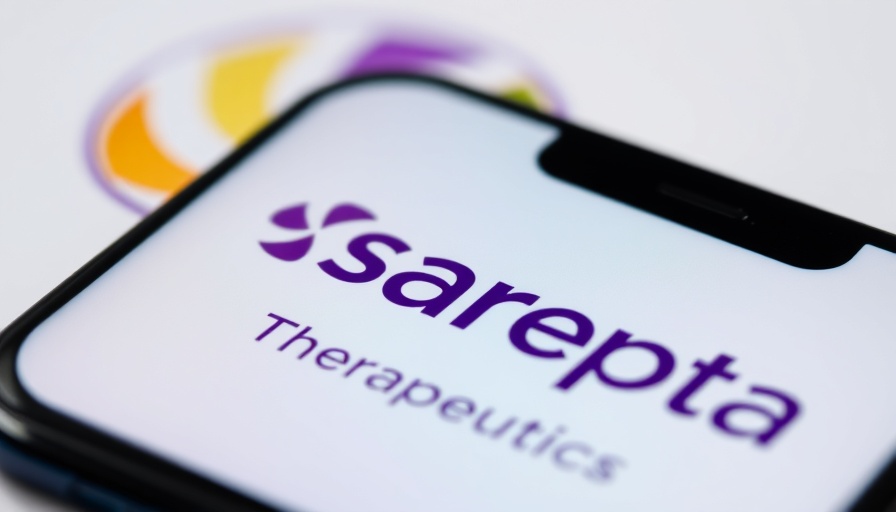
Sarepta’s Gamble: Gene Therapy in the Spotlight
In the realm of groundbreaking medical science, few moments captivate the public's attention like the conflict between innovation and safety. Sarepta Therapeutics currently finds itself at this intersection, as the FDA has urged the company to halt shipments of its Duchenne muscular dystrophy gene therapy, Elevidys, following the tragic deaths of three patients linked to the treatment. Yet, in a move that has drawn both praise and criticism, Sarepta has resolved to continue providing the medication, arguing that it poses no new safety risks for early-stage Duchenne's patients.
Understanding Duchenne Muscular Dystrophy and Elevidys
Duchenne muscular dystrophy (DMD) is a severe genetic disorder characterized by progressive muscle degeneration and weakness. The emergence of Elevidys, the first gene therapy approved specifically for DMD in the U.S., marked a significant milestone in treating this debilitating condition. Initially approved for younger patients who could still walk, Elevidys has now expanded its application to older individuals and those in later stages of the disease.
Despite the initial excitement, skepticism around Elevidys has lingered since its approval, particularly among FDA scientists who have questioned its efficacy. The recent deaths—two teenage boys who suffered liver injuries while using the treatment and a 51-year-old man in a separate trial—have reignited calls for increased scrutiny.
The Controversy: Innovation vs. Safety
As Sarepta stands firm against the FDA's request, the central debate remains: Should a potentially life-saving drug be allowed to continue circulation even in the face of fatal risks? Sarepta’s determination to keep Elevidys available reflects a larger tension in the medical and regulatory community about balancing innovation with patient safety.
FDA Commissioner Marty Makary emphasized that while access to critical treatments is vital, the agency is prepared to intervene when safety concerns emerge. This raises vital questions not just for Sarepta Therapeutics but for healthcare providers and patients alike, who must weigh the potential benefits of such therapies against the inherent risks.
The Emotional Toll and Ethical Dilemma
The emotional weight that families of DMD patients carry cannot be understated. For many, Elevidys represents a flicker of hope in a future often overshadowed by uncertainty and despair. The devastating impacts of DMD evoke a sense of urgency that can cloud judgment regarding safety. This dilemma poses an ethical question for healthcare professionals: How do they navigate the responsibilities of advocating for treatment while also ensuring patient safety?
Dr. Jennifer McKinley, a physician specializing in muscular dystrophies, conveyed her concern about the situation. “While advances in gene therapy are exciting, we must be diligent in ensuring these treatments do not come at the cost of lives. Families deserve both hope and safety.”
Patients’ Reactions: A Call for Transparency
As Sarepta amplifies its efforts to label Elevidys, including a significant warning about potential risks, the response from the community has varied. Patients and families affected by DMD are increasingly demanding transparency and accountability from pharmaceutical companies regarding the safety of their treatments.
“We need to know what potential risks we are accepting,” said David Harmon, a father of a DMD patient. “This treatment could change lives, but it shouldn’t come at the cost of a life.”
Future of Gene Therapy: A Path Forward
As gene therapy stands on the precipice of revolutionizing medicine, the ongoing discussions about Sarepta Therapeutics are likely to influence how future treatments are approached and regulated. The key takeaway is the essential need for balance—between the eagerness to provide novel therapies that may potentially save lives and the imperative that patient safety remains at the forefront of medical innovation.
While Sarepta's actions may raise eyebrows, they also illuminate a significant point: the journey toward effective medical treatments is often fraught with ethical dilemmas and tough choices. Moving forward, the industry must prioritize clear communication, transparency, and compassion, keeping patient outcomes at the heart of their mission.
In light of these developments, it becomes ever more essential for individuals and families facing challenges like DMD to remain informed. With ongoing discussions about the future of gene therapy, maintaining awareness can empower patients to make educated choices about their treatments.
As we navigate this complex landscape, educating oneself on health matters—like meal planning and weight management—can further enhance men's health and wellness. Consider developing a stronger understanding of sexual wellness, fitness routines, and nutrition tailored to male audiences as you ponder your health options.
 Add Row
Add Row  Add
Add 




Write A Comment